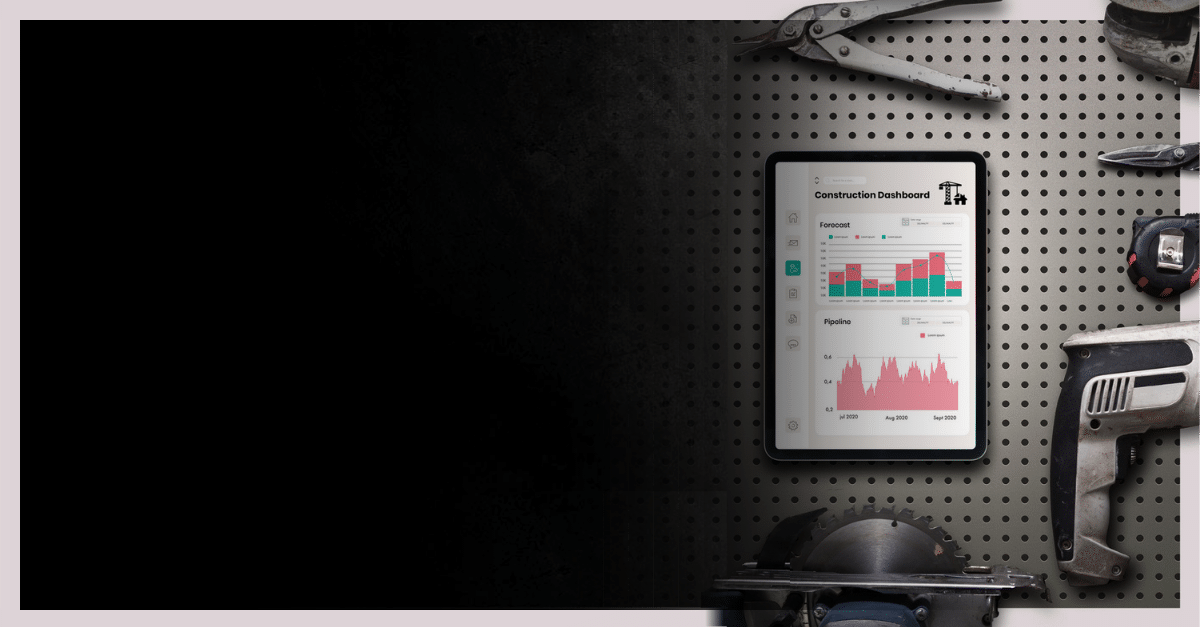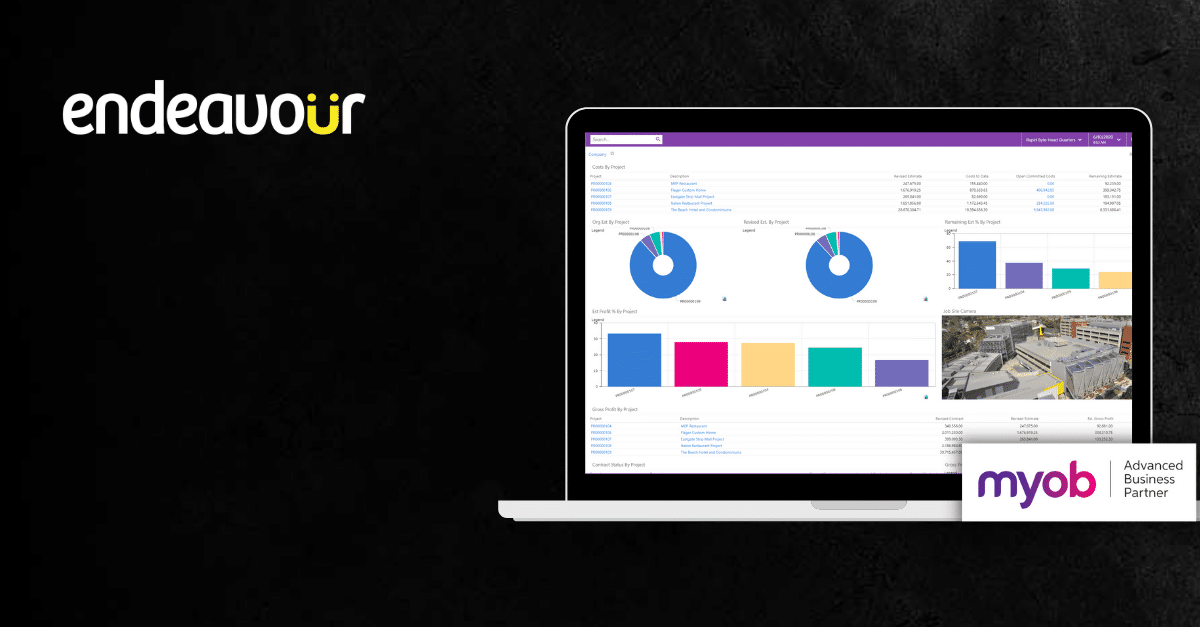SPONSORED POST
Five questions to ask yourself to help decide if an ERP system is the right fit for your construction company
If you’re reading this, it’s because you’ve been doing your due diligence around enterprise resource planning (ERP) systems, getting to grips with what they do, what impact they’ll have on your construction business, and, in the long run, if the ROI will be worth it. Good for you – it’s essential to conduct research before deciding to invest in anything, and ERP systems can be costly.
At Endeavour, we’ve successfully implemented many ERP systems, and we’ve gleaned some valuable insights. To help you decide if an ERP system would benefit your construction company and is worth the time and money you’ll need to invest, we recommend you ask yourself the following questions.
1: Are you concerned about how many construction budgets are going over time and budget?
Construction projects which run over time and budget is a common challenge faced by many construction companies. There are a number of reasons for this – market conditions around supply chains is a current leading cause – but it can also be due to outdated legacy systems.
Budget blowouts and delays can lead to a negative customer experience, which can cause significant reputational damage, because word-of-mouth is one of the most effective tools customers have, especially when it comes to construction projects. If they’ve had a wonderful experience with your construction business, they’ll tell others about it and recommend you to them. But they are just as likely to warn them off if you’ve disappointed them, and when they use online reviews to make their feelings known, word spreads very fast.
How does an ERP solution resolve this issue?
By harnessing the power of a cloud management platform for construction you’ll have the timely information, automation and integration you need to set yourself apart from competitors. You’ll have timelines and budgets well in hand with more accurate quoting, reduced errors with better communication, and the visibility to keep clients in the loop and catch and solve issues early.
An ERP system designed for the construction industry will ensure that all your business processes are running at optimal levels. Automation speeds these processes up, which means less delays. You’ll have up-to-the minute information which you can share with your customers if they make enquiries. Of course, if market conditions are causing supply chain problems, you’re still at risk of busting timelines or budgets, but an ERP system greatly reduces the likelihood of errors – meaning you’ll gain customer trust and increase your number of repeat customers.
Finally, if your customers are aware that you’re leveraging the latest technology to improve their experience, you’ll enhance your reputation as a leader in the construction industry. In today’s digital world, customers want to know you’re keeping up with new developments and harnessing them for their benefit.
2: Do you currently have several construction-related systems performing different tasks?
Think hard about how much time you and your teams are spending working with a range of business management systems. Are they using one for finance, another for sales, and yet others for project management? If you’re an enterprise-level construction company, you’re probably using even more than that, and the main reason you’re researching ERPs in the first place – your business processes and construction projects are not running as smoothly or efficiently as you’d like them to. Manual processes generate a higher number of errors, which take time to correct, and if your accounting team is working with outdated information, it can affect everything from project budgets to payroll.
How does an ERP solution resolve this problem?
By integrating everything, including your legacy systems. What this does is create a single source of truth, meaning that all your business functions rely on a central database. This information contains accurate, real-time data which is essential for decision-making. Manual processes are eliminated, which means that errors are greatly reduced and your team doesn’t have to waste time fixing them.
3: Is your IT infrastructure aligned with best practice?
This follows on from the above. If you have multiple, disparate systems in your construction business, your IT management becomes increasingly difficult. If they’re not designed for the construction industry, they can be costly to customise and maintain, both in time and money. This is especially true of on-premise systems, as upgrades can be more trouble then they’re worth, because they often over-ride any customisation you might have done and you’re back to square one again.
How does an ERP solution resolve this problem?
Again, integration of your systems using an ERP system that’s been designed for the construction industry provides you with the ability – and agility – to respond swiftly to the changing needs of any construction project. Customisation is much easier, since you can add new functions as needed. When you bring a construction-aligned ERP system on board, your other IT resources can be better deployed.
Get the full story on ERPs for the construction industry and how they ensure all your projects are delivered on time and on budget.
4: Do you experience difficulties accessing information about what’s happening in your business?
If you don’t have access to accurate, up-to-date and real-time data, then how do you know how well your business is performing? Think about how long it takes you to find information around sales data or KPIs. If this information exists in silos or in spreadsheets that have to be manually updated (and by several people) then the likelihood of that information being accurate is pretty low.
If you don’t have the right information at your fingertips, then it’s probable that you’re not making the best decisions for your business either. How can you be, if you’re working from outdated data?
And let’s face it – you don’t have time to go looking for information that should be easily and readily available. There are far more productive ways to spend your time.
How does an ERP solution resolve this problem?
With user-defined access, you and others on your team can view the information you need, when you need it. When an ERP system is implemented, access to information is defined by what role each user plays. For example, your executives or team managers can have a holistic view of the company’s operations and projects at any time, while other staff see only what they need for their role.
Because you’re not spending time trying to find the information you need, you can focus on more productive tasks – like using that information to make proactive decisions about your company’s growth. Not only that, but the information will be based on data that’s accurate and up-to-date, so the view you’re getting is realistic.
5: Are your accounting processes becoming more complex and bogged down?
One of the reasons you might be reading this is because you’re evaluating complaints from your accounting team. If they’re still using paper-based processes for activities like sales, invoicing and ordering, they’re going to be spending hours doing so. Paper-based, manual processes are time consuming and prone to error. Delays are common when invoices or approvals go astray, meaning more hours lost to tracking them down.
Not only that, but your accounting team is probably also telling you how long it takes them to consolidate or reconcile financial information, which is having a detrimental impact on reporting. And once again there’s the issue of accuracy – the more manual the process, the higher the likelihood of mistakes. When it comes to your company’s finances, errors of this type can be costly in money as well as time.
How does an ERP solution resolve this issue?
If all of your financial information and data is stored in a central database, your accounting team won’t have to spend hours cross-posting information, re-keying numbers, or reconciling data manually. Invoicing and approval processes will speed up significantly, while budgeting and payroll will become streamlined and much more efficient. You won’t be experiencing delays in financial reporting, and you’ll save money by not having to correct mistakes.
If you’ve answered ‘Yes’ to any or all of these questions, then it’s time to seriously consider making some big changes and bringing an ERP solution on board. By streamlining your business processes and operation, you’re enabling your staff to spend more time focused on what they do best. Not only that, but having the right systems in place, tailored for your organisation, mean that you’ll achieve scalable growth, and you’ll be running at maximum efficiency.
If you missed any of our previous articles, please click on the links below:
- Four things innovative construction companies will do during the construction boom. Download the ebook from this article: How technology is shaping the future of Construction.
- Why cloud-based ERPs are building the future for construction companies. Download the ebook from this article: Information: the most powerful tool for construction projects.
Endeavour Solutions implement ERP, business planning and business intelligence solutions from world-class software companies. Our aim is that your business has the information you need to make faster, smarter decisions. And that you can ‘join the dots’ right across your organisations – something we have been helping business with for over 30 years.
Contact us on 0800 422 272 or visit our website: www.endeavour.co.nz.
Position your company as an industry thought-leader
To find out more about sponsoring a post in Property Council’s publications, please click here.


